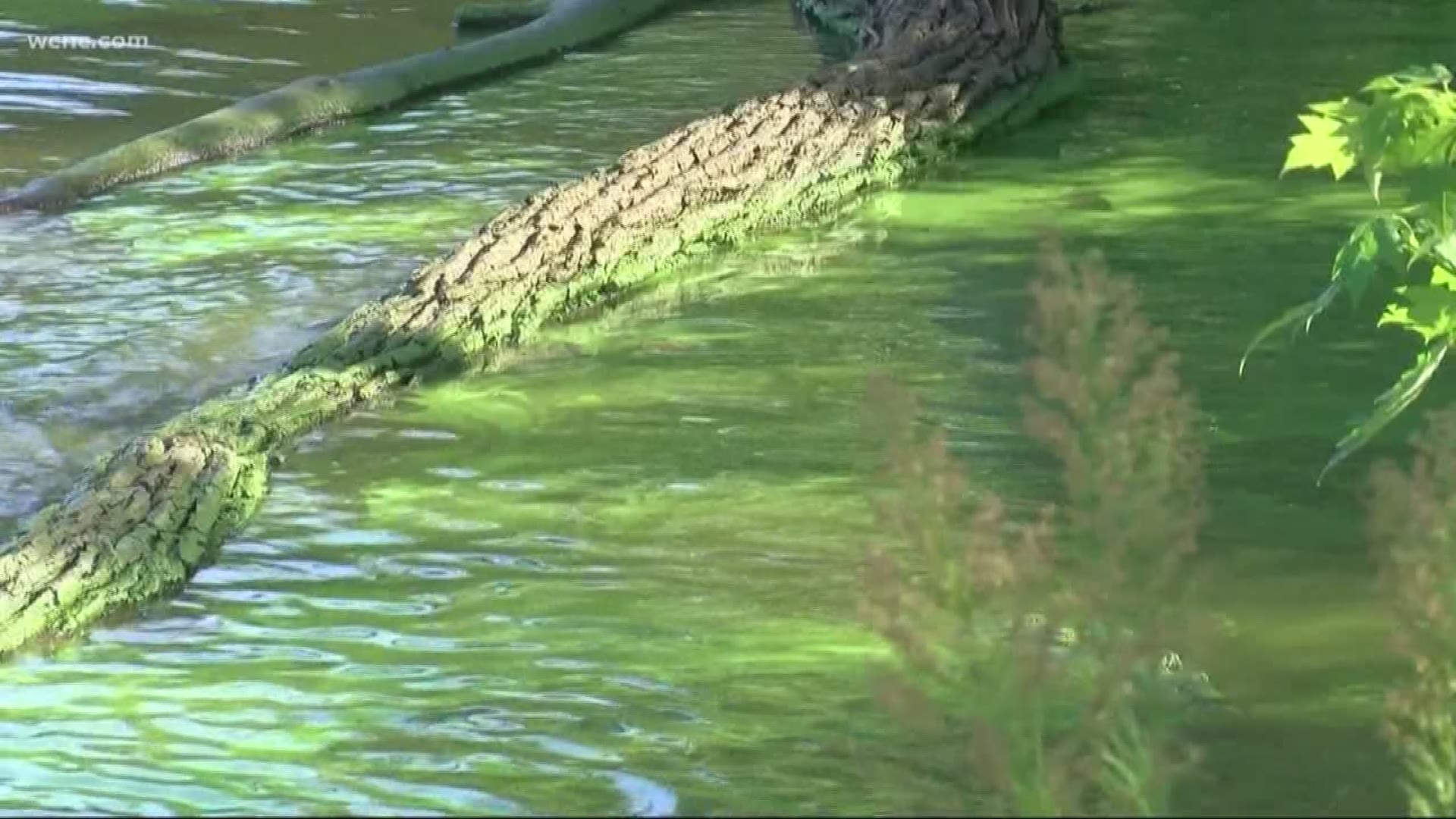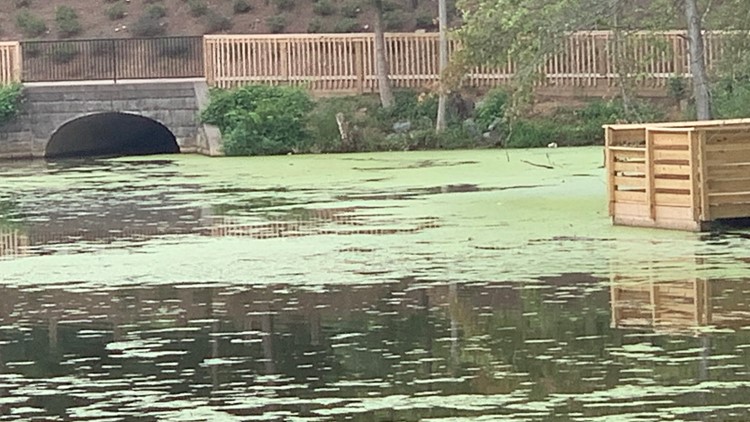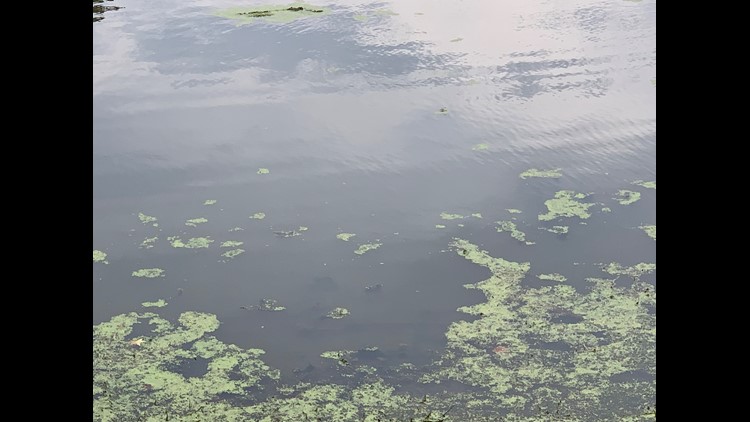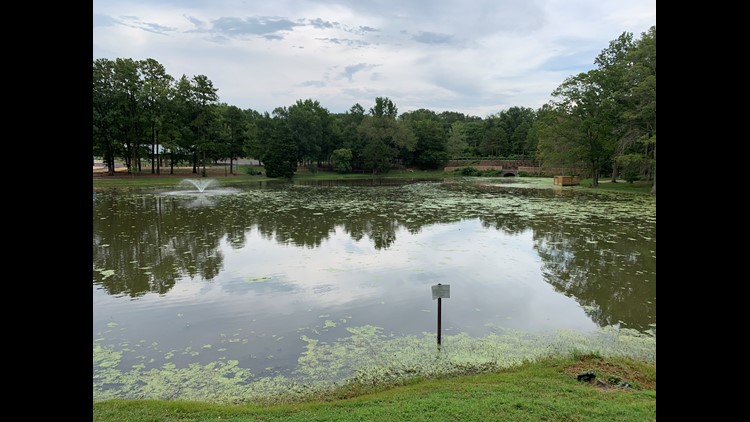CHARLOTTE, N.C. — A toxic blue-green algae blamed for killing at least four dogs across the Southeast has been found at Park Road Park in south Charlotte, Mecklenburg County announced Friday. This is the second pond in Mecklenburg County to test positive for the toxin.
Blue-green algae can release a toxin that could kill dogs and even young children, according to Mecklenburg County's Water Quality Program Manager Rusty Rozzelle
"In most ponds, you do have algae bloom this time of year," he said. "We find it in ponds every year, most ponds do have it. A lot of ponds probably have blue-green algae in it and people just don't know."
Charlotte-Mecklenburg Storm Water Services told NBC Charlotte its crews are testing public ponds in the county for the bacteria. They are not testing private ponds.
Park Road Park is the first public pond in Charlotte to test positive. The pond at Robbins Park in Cornelius had previously tested positive.
Park Road Park pond tests positive for deadly algae
Signs are being placed at Park Road Park warning visitors to keep themselves, their animals, and their children out of the water.
Tests still need to be performed at other Charlotte public ponds, such as Freedom Park. The Mecklenburg County Parks and Recreation expects Charlotte Storm Water Services to complete testing on those remaining 13 ponds before the end of August. Signs are being posted in all parks Friday as a precaution.
"This warning is only for ponds," Mecklenburg County said in a released statement. "Creeks and streams with flowing water are not typically impacted by blue-green algae that grows when water does not move."
The blue-green algae blooms are created from bacteria, such as fertilizer and others, that run-off into freshwater ponds and lakes after rainfall. Combined with heat, and Rozzelle explained its a perfect environment for the algae to grow.
When a dog comes in contact with the toxic algae, the animal can begin experiencing symptoms within minutes. Symptoms include vomiting, difficulty breathing, and seizures. For adults, the bacteria can irritate your skin, according to Rozzelle.
Treatment options are being considered for Park Road Park and other infected waterways.
Officials with the Town of Cornelius said they are treating the south pond at Robbins Park and advise people and pets to stay out.
Earlier this month, a Georgia family said their dog died after swimming in Lake Allatoona north of Atlanta.
"We took our sweet Arya to the lake and had the best day playing ball and swimming around!," Morgan Fleming said on Facebook. "About 30 minutes later on the drive home, we noticed her making weird noises."
Fleming said the dog started vomiting in the car. She took her dog to the emergency room, where the dog was pronounced brain dead, according to Fleming.
Fleming said no autopsy was done on her border collie. She said a vet explained the dog died "most likely" due to a lake toxin, such as blue-green algae.
RELATED: Couple shares warning on toxic algae after dog dies less than an hour after visit to the lake
Three other dogs died after swimming in a lake near Wilmington, North Carolina.
Another dog, identified as a police K-9 for the Hall County Sheriff's Office in Georgia, died this week after possible expose to the toxin.
In South Carolina, Lake Waterlee has tested positive for the algae.
Advice to keep your pet safe from blue-green algae
- If you see clumps of algae on the surface of the lake, keep your dog out of the water
- Keep your dog on a leash
- Do a quick 30 second scan on the whole lake
- Bring fresh water for your dog, and make sure your dog is drinking out of that
- Pre-program the phone numbers of your veterinarian, your emergency vet and the ASPCA animal poison control center in your phone







